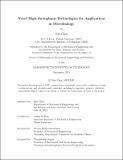| dc.description.abstract | Electroporation, a widely used gene delivery technique for bacterial transformation, involves applying an electric field to increase cell membrane permeability. However, the traditional cuvette-based protocol is laborious, time-consuming, low throughput, and operator dependent, hindering the progress of bacterial genetic engineering. To address these challenges, this study focuses on developing high-throughput solutions to streamline the process, improve efficiency, and ensure consistent results.
The primary contribution of this research is the development of—to the best of our knowledge—the first automated system for high-throughput bacterial genetic engineering. At the core of this system is a microfluidic device designed to integrate seamlessly with liquid handling robots. By performing electroporation column-by-column, this automated system achieves a 96-well electroporation in just 5 minutes, 30 times faster than performing 96 independent genetic transformations using cuvettes. Through experiments with Escherichia coli NEB10𝛽, it demonstrates high efficiency and consistency, enabling rapid and reliable genetic manipulation.
The introduction of high throughput electroporation results in other bottlenecks in the process, particularly in the assessment of transformation efficiency through colony counting. Existing automated colony counting solutions often struggle with merged colonies, a common issue in high-throughput plating. To address the need for a high-throughput evaluation solution to assess the efficiency of bacterial electroporation, we introduce MCount. MCount outperforms existing solutions by optimizing contour and regional pairing, resulting in low error rates and minimal reliance on hyperparameters. Moreover, we propose statistical methods that require few labeled or even unlabeled datapoints, ensuring consistently low error rates and facilitating deployment in scenarios with limited labeled data.
Finally, as conventional electroporation methods are limited to relatively small sample volumes (< 200 L), we present M-tube, a disposable and user-friendly microfluidic device for large volume (> 10 mL) bacterial gene delivery. With minimal fabrication requirements and straightforward operation, M-tube surpasses cuvettes in transformation efficiency and facilitates the creation of transposon mutant libraries.
Collectively, the high-throughput solutions for microbiology overcome the limitations of cuvette-based electroporation, significantly improving efficiency and consistency in bacterial genetic engineering. These advancements pave the way for accelerated research and development in the field, fostering breakthroughs in genetic manipulation and biotechnology applications. | |
